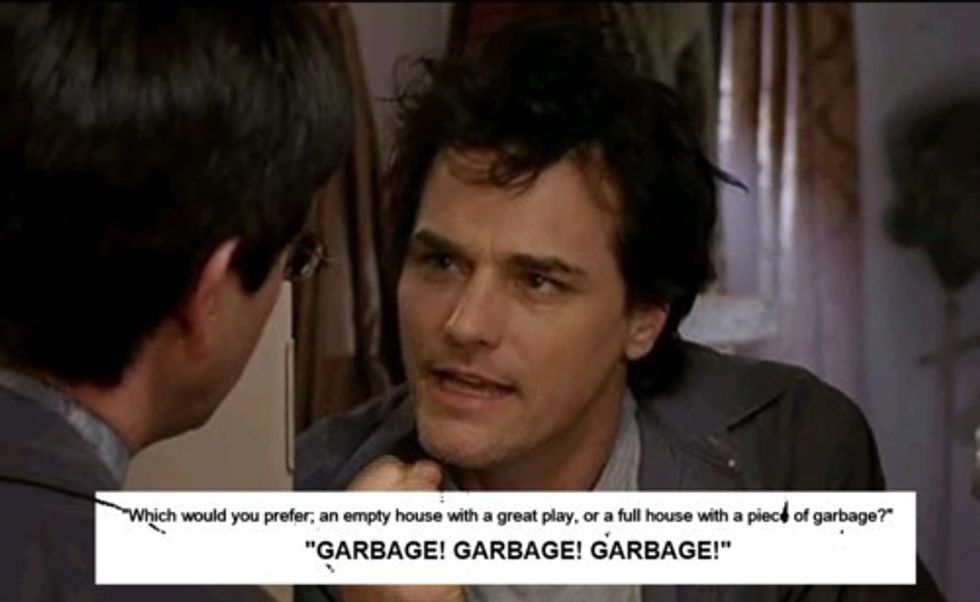I wouldn’t let anyone read my college essay but my mom. In AP English, one of our first assignments was to submit ours in for feedback and I wrote a second one just to avoid that. I was ok if there were mistakes. I was ok if a sentence could do with some improvements. What I couldn’t risk was any comments that made me start to doubt a document that, going into it, seemed like the most impossible of open-ended tasks. Now every word, whether correct or not, was me personified. However flawed, this was my college essay and I stood by it. If my dream college didn’t take to it, that school wasn’t meant to be.
Seems like a whole lot of big talk in retrospect--talk that I fortunately didn't have to act on either, but I was reminded of it recently as I continue to tackle the second biggest open-ended project I've ever had to face: senior thesis. Like my college essay, I'm going full circle for this paper by turning to a familiar source for inspiration: television, in particular the first season of SundanceTV's "Rectify." With that fantastic show by my side (and a lot of Coca Cola) I am going to graduate this May.
But for this article, I'd like to take a moment to commemorate the TV show that got me into college in the first place. Still as relevant in 2015 as it was in 2012, making its grand public debut, here is my college acceptance essay. "Slings and Arrows," this one's for you:
"Slings and Arrows" is that gem of a television show that no one has ever heard of. By way of its three short seasons, "Slings’" writers introduced viewers to a wonderful protagonist in Geoffrey Tennant. The star of the New Burbage Theater Company’s production of "Hamlet," Geoffrey’s performance is acclaimed until he suffers a nervous breakdown.This causes most of the actors and crew to believe he’s gone mad and his new position as the replacement artistic director only leads to panic. A reputation of having fallen apart on stage undermines any great ideas he brings to the table. Even now his strange antics continue as he 'talks' to the ghost of his job’s late predecessor, Oliver Wells. Fear for the company’s survival prevails but, in the end, Geoffrey orchestrates a hit on opening night, surprising everyone but himself.
Truth be told, "Slings" is a fictional television show (one that takes its dramatic and eccentric-filled setting very seriously) but at the core of Geoffrey Tennant is a person anyone can aspire to, myself included. Surrounded by doubters, Geoffrey could easily have caved to the mindset of the majority. Expectations are low and following the rules would make a profit, meaning happy investors. Such a move, though, would compromise the integrity of the stage Geoffrey loves. He is secure in his interpretations and makes them happen. He actually uses his authority, neither cruelly nor with trepidation of angering peers in the process. Such is the cost of being in charge. Geoffrey is a clever, well-meaning, creative person and, most of all, he is bold. Let them think what they will. The show must go on, the right way.
I think I’m just as confident as Geoffrey. I’m also creative and looking forward to expanding on my original thoughts with an education that brings pen to paper and opens up unknown opportunities. Still, from Geoffrey I’d like to take boldness. I’d like to be able to have my own metaphorical version of the literal sword fight Geoffrey has with Darren Nichols, a director who’d rather use tacky special effects then pay mind to the power of unadorned words. I want to speak up on the things I feel strongly about, when there’s no doubt in my mind yet I don’t take the time to vocalize that self-certainty. It’s like that dreaded history debate, the one I felt sure would take place purely between the most vocal of the class. When it was my character role that kept getting attacked, I had to speak up. If participation had merely been optional I would have never raised my hand but I was great. The best part was highlighting a classmate’s tactic of talking over me to prevent rebuttal with the retort, 'being able to talk louder doesn’t make you right.' Geoffrey succeeds when everyone assumes failure because he takes action. It’s action that’s important, me speaking up in class, making them laugh, and because of influences like Geoffrey, I hope to do just that.





















